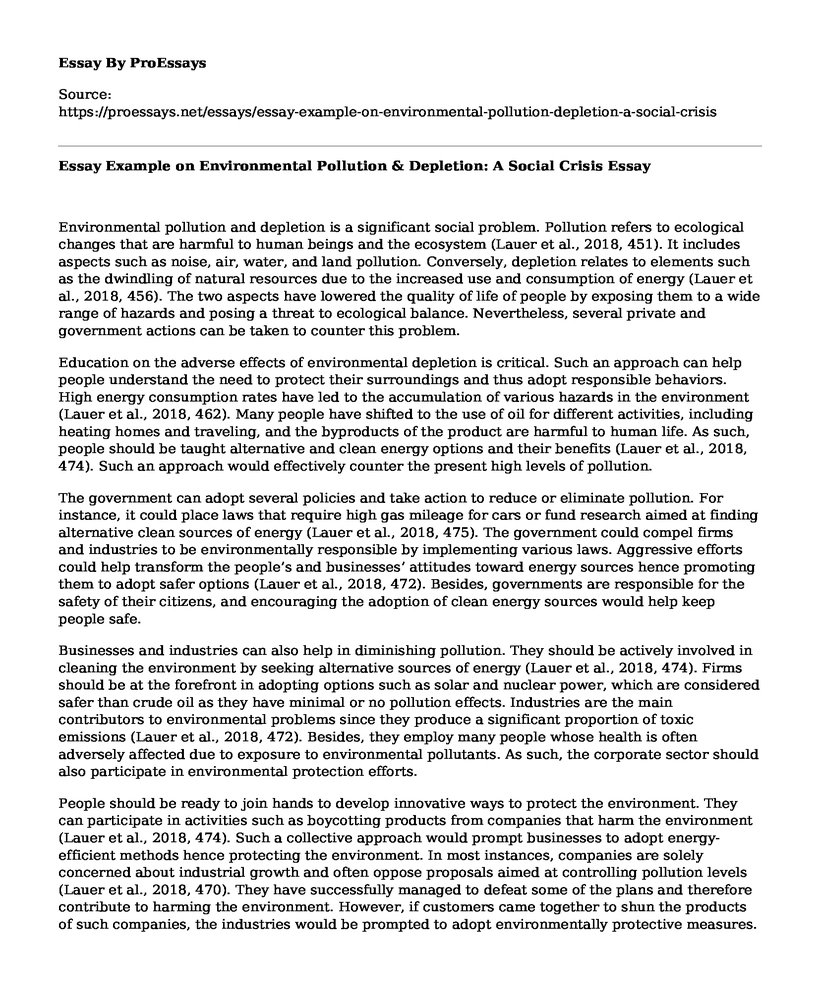Environmental pollution and depletion is a significant social problem. Pollution refers to ecological changes that are harmful to human beings and the ecosystem (Lauer et al., 2018, 451). It includes aspects such as noise, air, water, and land pollution. Conversely, depletion relates to elements such as the dwindling of natural resources due to the increased use and consumption of energy (Lauer et al., 2018, 456). The two aspects have lowered the quality of life of people by exposing them to a wide range of hazards and posing a threat to ecological balance. Nevertheless, several private and government actions can be taken to counter this problem.
Education on the adverse effects of environmental depletion is critical. Such an approach can help people understand the need to protect their surroundings and thus adopt responsible behaviors. High energy consumption rates have led to the accumulation of various hazards in the environment (Lauer et al., 2018, 462). Many people have shifted to the use of oil for different activities, including heating homes and traveling, and the byproducts of the product are harmful to human life. As such, people should be taught alternative and clean energy options and their benefits (Lauer et al., 2018, 474). Such an approach would effectively counter the present high levels of pollution.
The government can adopt several policies and take action to reduce or eliminate pollution. For instance, it could place laws that require high gas mileage for cars or fund research aimed at finding alternative clean sources of energy (Lauer et al., 2018, 475). The government could compel firms and industries to be environmentally responsible by implementing various laws. Aggressive efforts could help transform the people’s and businesses’ attitudes toward energy sources hence promoting them to adopt safer options (Lauer et al., 2018, 472). Besides, governments are responsible for the safety of their citizens, and encouraging the adoption of clean energy sources would help keep people safe.
Businesses and industries can also help in diminishing pollution. They should be actively involved in cleaning the environment by seeking alternative sources of energy (Lauer et al., 2018, 474). Firms should be at the forefront in adopting options such as solar and nuclear power, which are considered safer than crude oil as they have minimal or no pollution effects. Industries are the main contributors to environmental problems since they produce a significant proportion of toxic emissions (Lauer et al., 2018, 472). Besides, they employ many people whose health is often adversely affected due to exposure to environmental pollutants. As such, the corporate sector should also participate in environmental protection efforts.
People should be ready to join hands to develop innovative ways to protect the environment. They can participate in activities such as boycotting products from companies that harm the environment (Lauer et al., 2018, 474). Such a collective approach would prompt businesses to adopt energy-efficient methods hence protecting the environment. In most instances, companies are solely concerned about industrial growth and often oppose proposals aimed at controlling pollution levels (Lauer et al., 2018, 470). They have successfully managed to defeat some of the plans and therefore contribute to harming the environment. However, if customers came together to shun the products of such companies, the industries would be prompted to adopt environmentally protective measures.
Conclusion
Overall, environmental protection is critical to promote and sustain the quality of life. Harming the surroundings has several adverse effects, including health and imbalances in the ecological systems. It is, therefore, essential for various parties, including business and industry, the government, and individuals to put significant efforts in protecting and cleaning the environment. Such approaches will help counter the social problems associated with a polluted environment and help people reap the benefits of clean surroundings.
Reference
Lauer, Lauer, J. L., & Lauer, J. C. (2018). Social problems and the quality of life (14th Ed.). McGraw Hill.
Cite this page
Essay Example on Environmental Pollution & Depletion: A Social Crisis. (2023, Sep 07). Retrieved from https://proessays.net/essays/essay-example-on-environmental-pollution-depletion-a-social-crisis
If you are the original author of this essay and no longer wish to have it published on the ProEssays website, please click below to request its removal:
- Movie Analysis Essay on The End of Poverty
- Tohoku, Japan Earthquake on 11th March 2011 Essay Example
- Paper Example on Solar Power: Cost Reduction for Grid Parity
- Essay Sample on The Environmental Impact of Dairy Industries: Finding Sustainable Alternatives
- Recycling: A Need for Accurate Processes to Protect Environment - Essay Sample
- Environmental Health: Assessing Human Health and Disease Risk From Climate and Built Environments - Essay Sample
- Essay Example on Public Health & Climate Change: Identifying Populations at Risk







